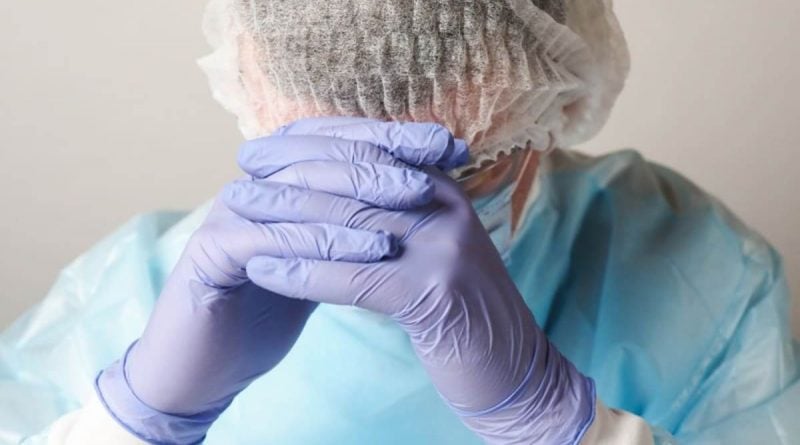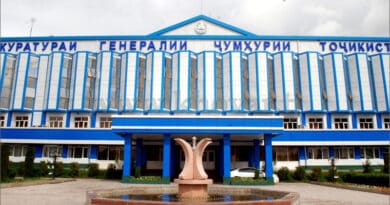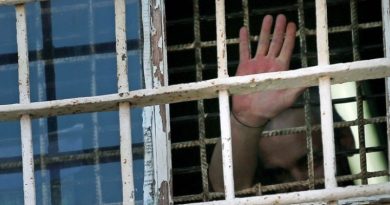Kyrgyzstan: the rights of doctors fighting COVID-19 massively violated
Health care workers in Kyrgyzstan have paid an exceptionally high personal cost in the fight against COVID-19. They were forced to work overtime for many days, often not receiving the promised additional payments and being held in quarantine conditions, comparable to prison. These are the conclusions drawn by the authors of the Amnesty International report.
Fake statistics on death
According to official data from the Ministry of Health, during the peak of the epidemic from mid-March to July 22, 29 health workers died. However, unofficial sources say the figure is 40 people.
“Doctors in Kyrgyzstan have worked selflessly, risking their lives every day to care for their patients, often in the absence of life-saving medicines. Without adequate support from the authorities, they relied on the help of volunteers. In return, they were denied the exercise of their human rights, many were underpaid, and many were forced to remain silent about their problems by threatening retaliation, ”said Heza McGill, Central Asia researcher at Amnesty International.
Absence of protective equipment
One of the most important protective measures for healthcare workers during the COVID-19 pandemic is having proper PPE. Under article 214 of the Kyrgyz Labor Code, employers must provide workers with PPE if they work in hazardous or unhealthy conditions, besides, they must be provided with additional pay for performing hazardous work.
However, according to Klara Sooronbaeva, a lawyer, head of the School of Human Rights NGO and currently a defender of the rights of doctors, the Labor Code does not provide adequate protection for health care workers, since they are not included in the list of professions whose representatives are entitled to an additional premium to salary. The provision of PPE has improved since the start of the pandemic thanks to the efforts of groups of volunteers who raised funds for the purchase and delivery of PPE to hospitals.
However, health workers and doctors interviewed by Amnesty International reported that doctors were forced to work without proper personal protective equipment in the early stages of the pandemic, and video interviews by Aid to Issyk-Kul group shows that working with infected COVID-19 patients, the doctor wears only a protective mask.
All doctors Amnesty International interviewed received PPE, but they complained of poor quality. Also, one of the doctors expressed concern that the proper use of PPE was not carried out, and that in the early stages, doctors did not always know how to put on and take off PPE correctly to avoid infection.
This was confirmed by Klara Sooronbaeva, who noted that the Labor Code “sets only general standards, and even in March, when there were a lot of cases, these standards were grossly violated. The doctors told me that they didn’t know how to put on PPE correctly. Everything was done at random. There should be a special room for changing clothes, but there was no training, and doctors took off PPE wherever they needed it, so they were everywhere. ”
Constant overtime
The workload of health workers in Kyrgyzstan has increased dramatically, and their working hours have significantly lengthened. Since May, doctors in Kyrgyzstan have been working in what the Ministry of Health has called “barracks mode” to cope with the intensifying pandemic. Doctors are forced to permanently reside near their place of work or be permanently at the workplace. All doctors who directly work with COVID-19 patients work out a fourteen-day shift, after which they quarantined for 14 days.
They spend all 14 days of quarantine after their shift not at home, but in hotels, hostels, or specially designated rooms in the hospitals where they work. All 14 days they are forbidden to leave their location for whatever reason, food is provided by the state or volunteers.
One doctor described the conditions of his stay as prison conditions. Another doctor interviewed by Amnesty International said that he had not seen his mother and children for four months.
Initially, the fourteen-day work shifts were divided into four-hour work periods, followed by 16 hours of rest. However, working hours have steadily increased as the burden on the health care system increased due to the increase in the number of cases of the disease, as well as since more and more doctors themselves became infected.
Reduction and delay of salaries
Doctors in Kyrgyzstan are among the lowest-paid specialists in the country. In the words of the Special Rapporteur on the right to health, the salaries of doctors and other medical personnel are unacceptably low, below the national average and the average salary in other sectors.
According to the National Statistics Committee, in July 2020, the average monthly salary of a health worker or social worker was 10,987 soms (approximately $ 145). The average monthly salary of an educational worker, professional, scientific, or technical specialist, and an employee in the field of finance or insurance was 13,746 soms ($ 179), 22,428 soms ($ 292), and 36,163 soms ($ 470), respectively.
As the speaker notes, low salaries of medical personnel negatively affect the quality of services and create preconditions for unofficial payments for medical services.
On July 17, the Union of Health Workers asked the President of Kyrgyzstan to raise the salaries of doctors. They reminded the president that in 2005 the Law on Health Protection of Kyrgyz Citizens was adopted, according to which the salaries of health workers should not be less than the average salary in the country. This law was never implemented in practice.
Doctors interviewed by Amnesty International indicated that they were not paid on time, and some were even subjected to arbitrary cuts in their salaries.
“The main thing is that they paid us the promised salary. I have to feed my family, ”said one doctor, who complained that the authorities had not fulfilled their promise to raise salaries.
Persecution for speaking out
Most worrisome, Amnesty International notes, was the fact that the doctors contacted by the organization’s representatives often did not want to speak, and even those who agreed to be interviewed asked not to be named, fearing reprisals from their superiors. On the few occasions when doctors publicly complained, they were threatened, terminated, or humiliated by their employers.
“The Kyrgyz government must take steps to build greater resilience in the health system to better cope with the pandemic and focus on protecting the rights of health workers. It must also ensure that everyone in the country can exercise their right to freedom of expression and take steps to protect whistleblowers, ”said Heza McGill.
Kyrgyzstan must fulfill its human rights obligations under the International Covenant on Economic, Social, and Cultural Rights and guarantee fair and favorable working conditions for all workers, including health workers. The Ministry of Health must ensure that all doctors are provided with PPE that meets international standards and that they are properly trained in how to use it to avoid infection.




